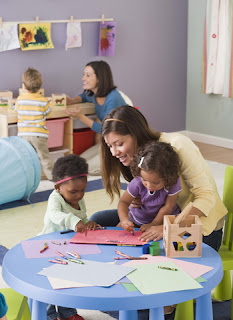Attitudes of early childhood educators in adapting to school
- Knowledge child's name prior to their arrival at the school.
- Creating a climate of security individual and collective emotional.
- Tranquility with manifestations of maladjustment the child (tantrums, cries, Inapetencias) but not abandoned.
- Individual attention But not exclusively, especially in everyday moments: arrivals, farewells, meals, understanding them as moments of great importance for the affective individually with the child, trying to avoid rushing, bustling or nerves.
- Knowledge of personaidadthe child through a parent interview, observation of the child and their reactions to everyday situations at school.
Child's social adaptation to the group
- Activities. As he adapts, educators are responsible for organizing activities for the child to get in touch with the rest of the group: Knowing the names of other children.
- Stages. Knowledge of the developmental stage being experienced by the child, understanding the egocentricity characteristic of this stage and helping overcome through group activities that encourage learning share material (not all mine), to care for and pick it up.
- New emotions. Educators try to channel their child aggressiveness in situations of sharing, looking for alternative ways (do not remove this toy to your friend, take another shelf).
- Behavior. The child's aggressive behavior must be understood as a form of normal relationship at this age and in the adaptation period. The limits to this behavior should be placed by educators in a non-aggressive and stress, like the rest of the educational limits that apply to school or daycare center.
Adaptation of the baby to the new space
- Knowledge of the material.
- Knowledge of cleanliness.
- Knowledge of the courtyard.
- Knowledge of dining room.
- Knowledge of nursing.
Relationship teachers with parents
- Interviews (also as a way to meet the parents and see their relationship with their children).
- Inputs and outputs must be at least possible conflict: patience with parents.
- Recommendations and bounds clear to parents from the beginning (timeliness, clothing marked) to avoid clashes.
Note: Explain to your child always new situations all going to live: everyday situations, activities, input, output, garden, food or nap.


















